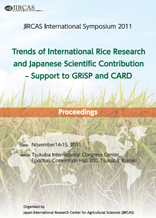Opening Remarks

Good Afternoon. Distinguished Guests, Participants, Ladies and Gentlemen, on behalf of the Symposium
Organizers, I have this honor and privilege to open the JIRCAS International Symposium 2011, “Trends of
International Rice Research and Japanese Scientific Contribution - Support to GRiSP and CARD”.
This symposium is organized by the Japan International Research Center for Agricultural Sciences
(JIRCAS), with the support of the Ministry of Agriculture, Forestry and Fisheries, Japan, National Agriculture
and Food Research Organization, National Institute of Agrobiological Sciences, National Institute for
Agro-Environmental Sciences, Japan International Cooperation Agency, two leading international research
organizations, namely International Rice Research Institute and Africa Rice Center, as well as Japan Forum on
International Agricultural Research for Sustainable Development.
First of all, I would like to extend my cordial welcome to all the guests and the participants, in particular to
those who came to Japan from overseas. I would also like to express my sincere thanks to the prominent
keynote speakers, Dr. Achim Dobermann, Deputy Director General for Research of IRRI, Ms. Concepci?n
Calpe, Secretary of the Intergovernmental Group on Rice of FAO of United Nations and Dr. Marco Wopereis,
Deputy Director General of Africa Rice Center , for their kind acceptance to deliver very relevant lectures
during this symposium. I would also like to extend my appreciation to the other speakers, chairs and
discussants in the sessions to follow.
As you may be fully aware, rice is the most important food crop in the world. Hence, stable supply and
improved productivity of rice are vital issues for achieving food security in the developing world. Price
volatility of staple food in recent years has activated discussions at various international forums on the
importance of increase in agricultural productivity and related science and technology development. At G20
meetings this year in France, for example, the necessity of enhancing agricultural research for development to
achieve world food security was repeatedly emphasized.
This year, new international research frameworks, such as the CGIAR Research Programs, have been
officially started. The Global Rice Science Partnership (GRiSP) is one of those Programs and it has made a
good start ahead of the other Programs. JIRCAS is actively participating in this framework as a strategic
partner. Inside Japan, a GRiSP Coordination Committee was organized among related research institutes last
August. I am sure that a global research coordination of this kind will be a powerful mechanism to enhance
the quality and effectiveness of our collective research activities.Looking at Africa, where a significant part of the population suffers from malnutrition, the Coalition for
African Rice Development (CARD) was organized in 2008 with the strong leadership of JICA and the
Alliance for a Green Revolution in Africa (AGRA). This initiative, which aims to double the production of
rice in Africa within ten years, provides a unique venue where research institutes and development
organizations can collaborate closely toward a common objective. JIRCAS tries to play a pivotal role for this
initiative with the help of other institutions and universities in Japan.
Ladies and gentlemen, JIRCAS commemorated its 40th founding anniversary last year, and the Third
Medium-Term Plan started in April this year. In the new Medium-Term Plan, we set up three research
programs. One of those programs, the Stable Food Production Program, places particular emphases on rice
researches, in which we believe Japanese expertise has shown comparative advantage globally. However, in
order to implement these activities more effectively and to integrate with the broader international frameworks,
it is essential to formulate a network connecting Japanese research forces and foreign/international
institutions.
Global agriculture changes in response to continuous social changes and emergence of global environmental
issues. Agricultural research is also facing a new era owing to a globalizing society, as well as the
advancements of science and technology in related fields. The Japanese agricultural research system,
including JIRCAS too, must find a new research direction utilizing new research and development networks,
such as GRiSP and CARD.
This symposium aims firstly, to obtain useful indications of this international and national networking though
the exchange of opinions on past experiences and future directions of rice research activities, and secondly, to
map out new directions to formulate domestic and international research networks. I sincerely hope that the
symposium will provide useful suggestions for the future activities of relevant research institutes as well as of
individual researchers who are engaged in the resolution of complicated and persistent agricultural and rural
problems in the world, particularly through rice science .
Finally, I would like to extend my special gratitude to MAFF for its support, because this symposium is partly
organized as an event of the “Global Scale Issue-oriented International Research Network Project”
commissioned by the Ministry.
Thank you very much for your kind attention.
| Date of issued | |
|---|---|
| Creator | Masa Iwanaga |
| Publisher | Japan International Research Center for Agricultural Sciences |
| Available Online | |
| Issue | 2011 |
| spage | 7 |
| epage | 8 |
| Rights | Japan International Research Center for Agricultural Sciences |
| Language | eng |
